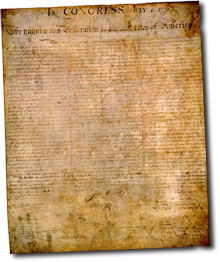Subtotal: $
Checkout
Freedom: A Declaration of Interdependence
By Charles E. Moore
July 4, 2018
Available languages: Español
The thought of a dismembered body part, like a severed finger or toe, both shocks and repulses us. It is incongruous and not quite human; removed from the body it is horrendously out of place.
With this image in mind, we must realize that freedom is not the same as independence. True freedom means being connected. A finger severed from the hand is not free!
Freedom is not the right to do one’s own thing on one’s own terms regardless of others. To be truly free “there must be weight,” wrote Kierkegaard, “just as the clock’s works need a heavy weight in order to run properly, and the ship needs ballast. And because the weight has vanished, the clock cannot run, the ship steers wildly – and for this reason human life has become a whirlpool.”
The opposite of freedom is not restraint, but impotence. Freedom has to do with capacity, not just possibility. Thus the apostle Paul writes: “You were called to be free. But do not use your freedom to indulge the sinful nature; rather, serve one another in love” (Gal. 5:13). Freedom involves the capacity to love, of forging bonds with others that make love possible.
The New Testament teaches that we are members of one another (1 Cor. 12:14-21). We are spiritually healthy insofar as the fabric of our lives is interwoven with each other. Faith is not a solo affair.
Interdependence, not independence, is God’s pattern for life. When we fail to be connected to one another we not only become alienated from God and others, but from our deepest selves.
But what does it mean to connect? Sadly, superficiality is a disease of our time. Shallow, virtual friendships and fragile, disposable relationships mark not only our society but also the church. Even our language betrays such superficiality. Consider the word “fellowship.” In Acts the early Christians “devoted themselves to the fellowship.” They did not just have food and fellowship, they were a fellowship. They were devoted to each other, and woven together in mutual care. Their life involved a common, daily, material existence of unity and sharing.
We, however, can only manage to assemble and associate and link our lives at ever increasing distances. Our lives, our souls, our decisions, our gifts, not to mention our homes and pocketbooks, are still very much our own and kept safe from others. With all our technological gadgetry we know how to keep track of each other and yet we really can’t depend on one another.
How do we overcome this? Jesus offers us freedom but his freedom is all about togetherness, not independence. The New Testament highlights the significance of sharing life together with the reciprocal pronoun “one another:”
- Outdo one another in showing honor (Rom. 12:10)
- Live in harmony with one another (Rom. 12:16)
- Speak straight to one another (Rom. 15:14)
- Have the same care for one another (1 Cor. 12:25)
- Serve one another (Gal. 5:13)
- Carry one another’s burdens (Gal. 6:2)
- Comfort one another (1 Thess. 5:11)
- Bear with one another in love (Eph. 4:2)
- Submit to one another (Eph. 5:21)
- Forgive one another (Col. 3:13)
- Confess your sins to one another (James 5:16)
- Pray for one another (James 5:16)
- Be hospitable to one another (1 Pet. 4:9)
From the above list one thing is clear: the life of faith involves a serious level of commitment to one another. How can we carry another person’s burden unless the burden is known and unless we are willing to actually carry it? How can we “bear with each other” unless we relate closely enough to get on each other’s nerves? How can we forgive one another unless we are in each other’s lives enough to hurt and let each other down? How can we confess to each other unless we share our lives fully together?
Sadly, too many of us want to stay free and easy; we don’t want to commit to anything, even less to anyone. We want our lives to be unencumbered, our options open. Inadvertently, instead of being free we imprison ourselves behind the bars of selfishness, suspicion, and all kinds of compulsive, self-destructive behaviors that leave us isolated and afraid. We are so “free” that we don’t want to give ourselves to anyone, we don’t even know who to be, or why we should really care about anything at all. Our so-called American independence has not led us to become masters of ourselves but rather masters of over-activity and over-consumption, committed to nothing other than making money and spending it on ourselves.
If we want to celebrate our freedom we need to take a hard look at what this really means. We might also want to consider anew the power there is in sacrificing our so-called freedoms for the sake of others. It is a paradox. But to be bound together in love, to be freed from oneself and become a person who is really there for others, is the greatest freedom. It is the only freedom worth living and dying for.

Already a subscriber? Sign in
Try 3 months of unlimited access. Start your FREE TRIAL today. Cancel anytime.







Kevin Cushing
Tell your definition of freedom to our politicians spouting it, to those singing "The Star Spangled Banner", and to those worshipping the "free market"!
Ohbee
Much wisdom here
MICHAEL NACRELLI
Of course, the Declaration of Independence refers to political independence from the British Empire, not personal independence from others. Apples and oranges.
Mark
Wow! Rich, concise, timely! I like, "Faith is not a solo affair." So true. The life of God flows through relationship, not in isolation. Thank you for this thought-provoking word!